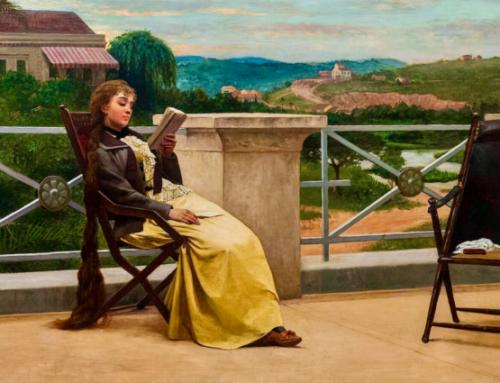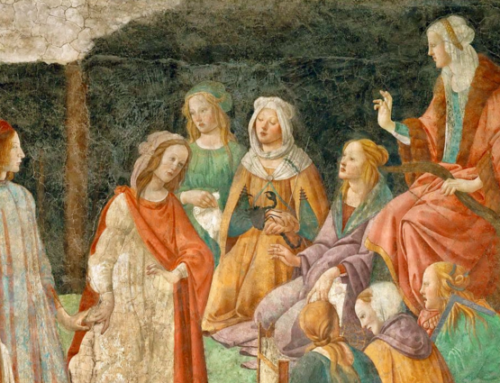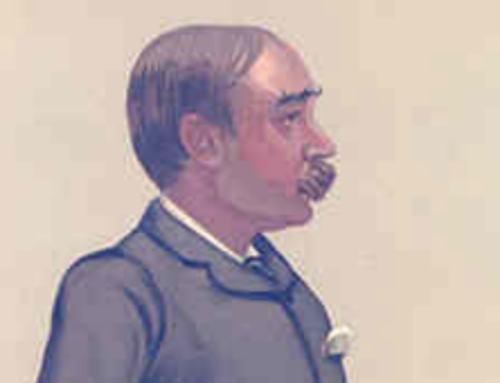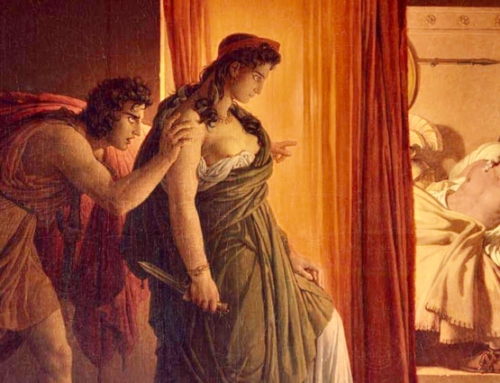It is hard to imagine how this country will recover from the hostility and political polarization that now define it without rediscovering a “pre-political loyalty,” as Sir Roger Scruton called it, “towards something higher, something that is shared between all the citizens, regardless of their political beliefs and inclinations: the nation.”
 With Roger Scruton’s passing the world lost one of the most prominent modern conservative thinkers. Critical commentary on social media was predictable. He was widely dismissed as a “fascist” who allegedly encouraged dangerous populism and hostility towards immigrants. His description as a “conservative” alone seemed to trigger an intuitive outrage rather than any willingness to grapple with his ideas. That’s a pity, because Sir Roger’s philosophy cannot be easily dismissed by those who seriously engage with it. Indeed, it challenges intellectuals on both sides of the political spectrum to reassess political categories. As such, Scruton’s conclusions offer a starting point for intellectual debate and contain the remedy for an identity crisis that Western societies currently face.
With Roger Scruton’s passing the world lost one of the most prominent modern conservative thinkers. Critical commentary on social media was predictable. He was widely dismissed as a “fascist” who allegedly encouraged dangerous populism and hostility towards immigrants. His description as a “conservative” alone seemed to trigger an intuitive outrage rather than any willingness to grapple with his ideas. That’s a pity, because Sir Roger’s philosophy cannot be easily dismissed by those who seriously engage with it. Indeed, it challenges intellectuals on both sides of the political spectrum to reassess political categories. As such, Scruton’s conclusions offer a starting point for intellectual debate and contain the remedy for an identity crisis that Western societies currently face.
According to Sir Roger, a nation-state that serves its citizens and secures peace within its borders cannot be informed by religion or ethnicity, but is, instead, a historical “settlement” built on trust and neighborliness “shaped from the countless agreements between people who speak the same language and live side by side; it results from compromises established after many conflicts, and expresses the slowly forming agreement among neighbors both to grant each other space and to protect that space as common territory.” By nature, such communities are “discriminatory” as they are secured by commonly held values and traditions while, however, absorbing and adjusting to minorities who, in turn, adjusted, building a “shared routine of tolerance.” Scruton insisted that only a community based on a shared identity of customs and beliefs can rely on sacrifice and trust among its members.[1]
Scruton recognized that traditional communities in Europe and the United States are being challenged by globalization, social mobility, and migration. Western societies have lost their sense of a “we,” their community identity. Increasingly radicalized popular sentiment is the predictable outcome of such a vacuum of meaning. Scruton’s philosophy challenges conservative and liberal intellectuals alike to raise the question of national identity anew and define the parameters of their communities.
In the United States, perceptions of social fragmentation have led to increasing political polarization and the country is effectively split in two. Elections are won by appealing to newly constituted identities that are informed by emotion and desire for recognition. Political rivalry is driven not by the question of which candidate will serve shared American principles most effectively, but by stoking the fires of social divisions. Barack Obama’s call for “change” and Donald Trump’s appeal to American “greatness” ring hollow as long as there is no agreement on what America was, is, and should be based on higher principles of an American community. Yet the terms “change” and “greatness” can become dangerous terms by virtue of their vagueness. The American electorate, for lack of principled leadership, has personalized these terms and has come to view them as justifications for deep hostility and arrogance towards at least one half of their country. Simplistic talking points made by politicians, a sensationalizing media, and intellectual inertia and self-righteousness have prevented any sort of constructive conversation about American identity. As a consequence, the American political landscape seems devoid of constructive debates.
Given this sad state of affairs, Scruton’s thinking is both pertinent and uncomfortable for it challenges traditional political paradigms. Liberal ideas of individualism betray an ignorance of what ties communities together and offer no defense against social fragmentation and anarchy. In the absence of overriding principles, the splintering of American society into individualistic “identities” exacerbates divisiveness. Immigrant communities, Scruton insisted, must accept compromises to preserve the integrity of the community that welcomed them. Conservatives, on the other hand, should heed Scruton’s insistence on adaptability in the face of change, such as environmental destruction and the arrival of new cultural influences due to immigration. He adhered to a Burkean conservatism in which “we must reform in order to conserve” and advocated an adaptable conservatism as defense against the destruction of shared customs and values. He dismissed liberal efforts of forcing political solutions from above but also cautioned conservatives to be wary of summoning uncontrollable social forces from below. In effect, Scruton argued, both the concept of Enlightenment citizenship of liberal politics and the idea of the nation-state are vital to the proper functioning of a republic. They are co-dependent for “without national identity and the loyalty that stems from it, there is no way to build a society of citizens.”[2]
American intellectuals and political personalities appear content to spar with increasing hostility, taking turns in scoring points and exposing scandals. Various identity groups and disgruntled constituencies cheer noisily from the sidelines. The public is neither served nor amused by this drama. In the absence of constructive and political debate that can inspire by appealing to principle, the American majority is turning away from politics in apathy or revulsion.
An NPR poll conducted in early 2018 revealed that 54 percent of Americans had either no or “not very much” confidence in the presidency as an institution while 36 percent lacked confidence in the Supreme Court. The most recent Gallup poll measures approval of Congress at 23 percent. The trend of distrust in our governmental and other national institutions appears to be rising according to according to Yuval Levin’s recent published book A Time to Build. It is only a matter of time before this majority turns angry and impatient. History has taught us that emotionally driven minorities rarely pose a threat to democracies, but majorities, whose patience with the regular political process has been exhausted and who consider dramatic change to be the only option, do. In the meantime, intellectuals are missing the opportunity to conceptualize a national identity based on community ties and shared values which can adapt to the demands of inevitable change. This country is broken and only a joint reassessment of its identity will mend it.
In America, the question of “who are we?” should be more present than anywhere else. The United States is the longest functioning democratic republic in history and its national community was conceived of as an ideal based on shared principles of freedom and equality. The abstract nature of this ideal gives it both form, in terms of boundaries, and direction, in terms of potential and adaptability. However, the ideal of America as a nation of many cultural identities is in danger of social and political dissolution without a habitual taking stock of who that “we” is and what it is becoming. European nations have the advantage as well as the challenge of presiding over communities that are bound together by long histories and rich cultures. America, on the other hand, derives its raison-d’etre from ideals that must be nurtured and translated for each new generation for, as Scruton wrote, “freedom is not a set of axioms but an evolving consensus.” [3]
America as a political community must rediscover what Scruton called “pre-political loyalty” in the form of trust regardless of politics for “it makes those who exercise power accountable to those who did not vote for them.”[4] Democracies endure, Sir Roger argued, “because the loyalty of the citizens is not towards government, but towards something higher, something that is shared between all the citizens, regardless of their political beliefs and inclinations. This higher thing is the nation.”[5] It is hard to imagine how this country will recover from the hostility and political polarization that now define it without revitalizing the nation-state and renewing its legacy of social trust.
This essay was first published here in February 2020.
The Imaginative Conservative applies the principle of appreciation to the discussion of culture and politics—we approach dialogue with magnanimity rather than with mere civility. Will you help us remain a refreshing oasis in the increasingly contentious arena of modern discourse? Please consider donating now.
Notes:
[1] Quotations are taken from Roger Scruton’s speech “Renewing our Communities by Revitalizing the Nation State” given at the “Europe at a Crossroads: The Virtue of Nationalism” conference in London, England, May 13, 2019.
[2] Quotation taken from Roger Scruton’s address given to Polish parliament, reprinted by mercatornet.com, June 13, 2019.
[3] Roger Scruton, Conservatism: An Invitation to the Great Tradition, Introduction.
[4] Ibid.
[5] Quotation taken from Roger Scruton’s address given to Polish parliament, reprinted by mercatornet.com, June 13, 2019.
The featured image is courtesy of Pixabay.







He passed on Edmund Burke’s birthday. I wonder if he knew that. RIP.
Thank you for a well written article.
I like this compilation . How do we as citizens aid in this change?
When did a pre-political agreement or settlement exist in America uninformed by Christianity ever exist? Never, in my view. I believe Scruton spoke out of both sides of his mouth on this issue. On the one hand he wrote insightfully of the deep shaping of the West by Christianity. But then he seemed to want to minimize that deep shaping by appeal to Jesus’ “render to Caesar . . .” comment and by insisting that Christianity or whatever religion or no religion one adopts is a private matter. Which is it? There is no settlement possible between one group that celebrates abortion and transgender mutilation and one group that recognizes these practices as evil. No compromise or settlement possible between on group that does not know what a woman is and one that does.